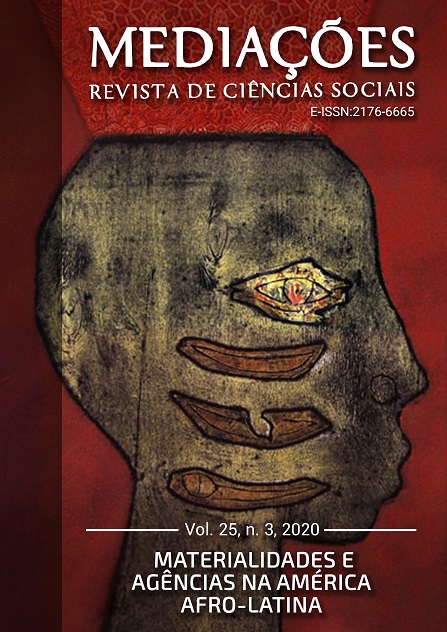Bourdieu as Kant's reader: essay on the theoretical genesis of the aesthetic experience's limits in Bourdieusian sociology
DOI:
https://doi.org/10.5433/2176-6665.2020v25n3p658Keywords:
Pierre Bourdieu, Taste, Aesthetics, Reflexivity, FreedomAbstract
This essay intends to subject Pierre Bourdieu's aesthetic thinking to reflexive criticism. For this, it defends the partial and flawed character of the reflexivity carried out by the French sociologist - especially with regard to the theoretical determinants of his aesthetic approach -, implying in two problems: (1) restricted view of the relation between freedom and aesthetic experience; and especially (2) inability to develop reflexivity from aesthetic experience. The objectivist critique seeks to reveal the theoretical determinants that have resulted in such damages, recognizing the role played by the Aesthetics of Taste, especially Kant, in the aesthetic approach of Pierre Bourdieu.Downloads
References
ADORNO, Theodor. Teoria estética. Tradução de Artur Morão. Lisboa: Edições 70, 1970.
ADORNO, Theodor; HORKHEIMER, Max. Dialética do esclarecimento: fragmentos filosóficos. Rio de Janeiro: Jorge Zahar Ed, 1985.
AGAMBEN, Giorgio. Gosto. In: ENCICLOPÉDIA Einaudi. Portugal: Imprensa Nacional/Casa da Moeda, 1992.
ALEXANDER, Jeffrey. The reality of reduction: the failed synthesis of Pierre Bourdieu. In: ALEXANDER, Jeffrey. Fin de siecle social theory: relativism, reduction and the problem of reason. London: Verso, 1995. p. 128-217.
BAUMGARTEN, Alexander. Estética: a lógica da arte e do poema. Petrópolis-RJ: Vozes, 1993.
BOURDIEU, Pierre. A distinção: crítica social do julgamento. 2. ed. Porto Alegre: Zouk, 2011.
BOURDIEU, Pierre. Meditações pascalianas. Rio de Janeiro: Bertrand Brasil, 2001.
BOURDIEU, Pierre. Outline of a theory of practice. New York: Cambridge University Press, 2013.
BOURDIEU, Pierre. Questões de sociologia. Lisboa: Fim de Século, 2003.
BOURDIEU, Pierre. Sociologia. São Paulo: Ática, 1983.
BOURDIEU, Pierre; CHAMBOREDON, Jean-Claude; PASSERON, Jean-Claude. Ofício de sociólogo: metodologia da pesquisa na sociologia. 8. ed. Petrópolis: Vozes, 2015.
BOURDIEU, Pierre; WACQUANT, Loïc. An invitation to reflexive sociology. London: The University of Chicago, 1992.
BURKE, Edmund. Uma investigação filosófica acerca da origem das nossas ideias do sublime e do belo. Lisboa: Edições 70, 2013.
CARCHIA, Gianni; D'ANGELO, Paolo. Dicionário de estética. Lisboa: Edições 70, 2009.
D'ALEMBERT, Jean. Reflexions on the use and abuse of philosophy in matters that are properly relative to taste. In: GERARD Alexander. An essay on taste by. London: Printed for A. Millar; A. Kincaid and J. Bell, 1759. Disponível em: https://archive.org/details/essayontaste00geraiala. Acesso em: 1 abr. 2018.
DANTO, Arthur. A transfiguração do lugar-comum: uma filosofia da arte. São Paulo: Cosac Naify, 2010.
DANTO, Arthur. Marcel Duchamp e o fim do gosto: uma defesa da arte contemporânea. ARS, São Paulo, v. 6, n. 12, p. 15-28. jul./dez. 2008.
DANTO, Arthur. O abuso da beleza: a estética e o conceito de arte. São Paulo: Editora WMF Martins Fontes, 2015a. (Coleção Mundo da Arte).
DANTO, Arthur. O descredenciamento filosófico da arte. Belo Horizonte: Autêntica Editora, 2015b.
FRANZINI, Elio. A estética do século XVIII. Lisboa: Editorial Estampa, 1999.
GADAMER, Hans-George. Verdade e método: traços fundamentais de uma hermenêutica filosófica. Petrópolis, RJ: Vozes, 2014. v. 1.
HAMLIN, Cynthia. An exchange between Gadamer and Glenn Gould on hermeneutics and music. Theory, Culture and Society, London, v. 33, n. 3, p. 103-122, mar. 2016.
HEGEL, Georg. Cursos de estética. 2. ed. São Paulo: Editora da Universidade de São Paulo, 2001. (Clássicos; 14). v. 1.
HILGERS, Mathieu. Habitus, freedom, and reflexivity. Theory & Psycology, Los Angeles, v. 19, n. 6, p. 728-755, dec. 2009.
JAY, Martin. Downcast eyes: the denigration of vision in twentieth-century french thought. California: University California Press, 1993.
JENKINS, Richard. Pierre Bourdieu and the reproduction of determinism. Sociology, Oxford, v. 16, n. 2, p. 270-281, maio 1982.
KANT, Immanuel. Crítica da faculdade do juízo. 2. ed. Rio de Janeiro: Forense Universitária, 2010.
KARAKAYALI, Nedim. Reading Bourdieu with Adorno: the limits of critical theory and reflexive sociology. Sociology, Oxford, v. 38, n. 2, p. 351-368, apr. 2004.
KNAFO, Samuel. Bourdieu and the dead of reflexivity: on the impossible task of locating the subject. Review of International Studies, Cambridge, v. 42, n. 1, p. 25-47, 2016.
KORSMEYER, Carolyn. Hume and the foundations of taste. The Journal of Aesthetics and Art Criticism, Madison, v. 35, n. 2, p. 201-215, 1976.
KORSMEYER, Carolyn. Making sense of taste: food and philosophy. New York: Cornell University Press, 2002.
LEVIN, Michael. The opening of vision: nihilism and the postmodern situation. London: Routledge, 1988.
MALVEZZI, Amarildo. Estética, liberdade e reflexividade: repensando Bourdieu. Sociologias, Porto Alegre, v. 21, n. 52, p. 192-219, dez. 2019.
NIETZSCHE, Friedrich. Genealogia da moral: uma polêmica. São Paulo: Companhia das Letras, 1998.
PETERS, Gabriel. A ciência como sublimação: o desafio da objetividade na sociologia reflexiva de Pierre Bourdieu. Sociologias, Porto Alegre, v. 19, n. 45, p. 336-369, maio/ago. 2017.
PETERS, Gabriel. Habitus, reflexividade e neo-objetivismo na teoria da prática de Pierre Bourdieu. Revista Brasileira de Ciências Sociais, São Paulo, v. 28, n. 83, p. 47-71, out. 2013.
REID, Thomas. Essays on the intellectual powers of man. Dublin: Printed for L. White, 1786. Disponível em: https://archive.org/details/essaysonintellec02reiduoft. Acesso em: 1 abr. 2018.
RIMBAUD, Arthur. Prosa poética. Tradução de Ivo Barroso. Rio de Janeiro: TopBooks, 2007.
VERCELLONE, Federico. A estética do século XIX. Lisboa: Editorial Estampa, 2000.
Downloads
Published
How to Cite
Issue
Section
License
Copyright (c) 2020 Amarildo Malvezzi

This work is licensed under a Creative Commons Attribution 4.0 International License.
Copyright on articles published in Mediações belongs to the author(s): in the case of partial or entire republication of the original publication, we ask author(s) to indicate the original publication in the periodical.
Mediações uses the Creative Commons Attribution 4.0 International license, which allows Open Access, enabling any user to read, download, copy and disseminate its content so long as adequately referenced.
The opinions expressed by the author(s) are their sole responsibility.
Funding data
-
Conselho Nacional de Desenvolvimento Científico e Tecnológico
Grant numbers 141530/2014-6
































